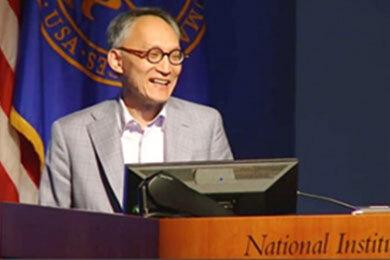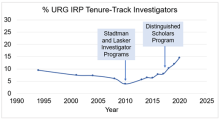
NIH
In this week's blog post, I am happy to introduce Dr. Carl Hashimoto. Dr. Hashimoto leads the NIH Distinguished Scholars Program (DSP) and is the Senior Advisor for Faculty Development in the NIH Office of Intramural Research. He supports early career stage investigators' professional and career development in the NIH Intramural Research Program. He serves as an independent resource for tenure track investigators and assistant clinical investigators to address issues affecting their work and life as NIH scientists. Prior to joining NIH, he served as director of the Cell Biology PhD program at Yale and was a faculty member for 26 years. In addition to teaching, Dr. Hashimoto conducted research on the molecular biology of early embryonic development, specifically the problem of how embryonic dorsoventral axis is established in Drosophila.
Read our Q&A with Dr. Hashimoto below to learn more about the Distinguished Scholars Program as an effective model for increasing and sustaining diversity among tenure track investigators.
Q: What is the aim of the Distinguished Scholars Program?
The DSP aims to build a more inclusive community within the NIH Intramural Research Program by reducing barriers to the recruitment and success of principal investigators from underrepresented groups in biomedical research—specifically, African Americans, Hispanics, American Indians and Alaska Natives, Native Hawaiians and other Pacific Islanders, individuals with disabilities, individuals from disadvantaged backgrounds, and women.
Q: What is the process for selection into the DSP?
Eligible candidates are nominated by the Scientific Director (SD) of an NIH Institute or Center (IC). Any individual who is competitive for a tenure track position at the NIH and has demonstrated a strong commitment to promoting diversity and inclusion is eligible for consideration and nomination for the DSP. Applicants to the Stadtman and Lasker Clinical Research Scholars programs are also eligible.
Nominated candidates are required to submit a statement describing their commitment to promoting diversity and inclusion with evidence in their track record of activities. A committee of SDs and NIH investigators review and rank the nominations with the final selection made by DSP leadership. Up to 15 tenure-track investigators are recruited each year, although Assistant Clinical Investigators have also been recruited in the past.
Q: What are some unique features of the DSP?
The DSP provides mentorship, networking opportunities, and financial support to selected scholars. Scholars receive mentorship from highly experienced NIH senior investigators and professional leadership training, including access to workshops on a variety of management skills and tactics. Additionally, scholars receive informal networking opportunities with NIH leadership, such as the NIH director, IC directors, and SDs. Lastly, funding to support the scholars' research is provided for the first four years of the tenure track appointment.
Q: Where does funding for the DSP come from?
Financial support for the DSP comes from a central fund of contributions made by the ICs, which have committed to supporting the program for the foreseeable future beyond the original 3-year pilot phase. Each scholar receives research funding from the DSP for the first four years of their tenure-track appointment. The respective ICs provide any supplemental funding during the first four years and full funding after that.
Q: When is the next nomination cycle for the DSP?
Nominations for the 2021 cohort of scholars closed in May 2021; however, anticipated future deadlines are March 15, 2022 and May 1, 2022. Visit our webpage to learn more about DSP eligibility and the nomination process.
Q: Is there evidence of the DSP's success?
Since the establishment of these programs, we have seen a marked increase in Intramural tenure-track investigators from underrepresented groups (Figure 1) and expect to see a similar trend in 2021 and beyond.
Figure 1. Percentage of NIH Intramural Research Program Tenure Track Investigators from Underrepresented Groups Over Time (1990 – 2025)

In addition to the data depicted above, the words of our DSP scholars speak volumes about the value and promise of this program model.
- “Love the cohort, I feel part of a special group of people, I appreciate the support from NIH leadership to the DSP.”
- “Collegial support and DSP leadership support was awesome. This group allows us to envision ourselves as great leaders through the dinner discussions with current leaders, provides brainstorming and avenues on how to improve NIH and affords us with superb mentoring.”
- “It’s been a valuable program that provides built-in mentorship and an inside look at the machinations of NIH as well as opportunities to network with intramural leaders that we would otherwise not have easy access to.”
Dr. Bernard's Parting Thoughts:
The NIH Distinguished Scholars Program presents a novel cohort model for supporting investigators who are outstanding scientists in their fields and deeply committed to diversity and inclusion. I look forward to the continued growth of the program. Dr. Carl Hashimoto is to be congratulated for his leadership and for the significant impact of this program in diversifying the NIH IRP.

